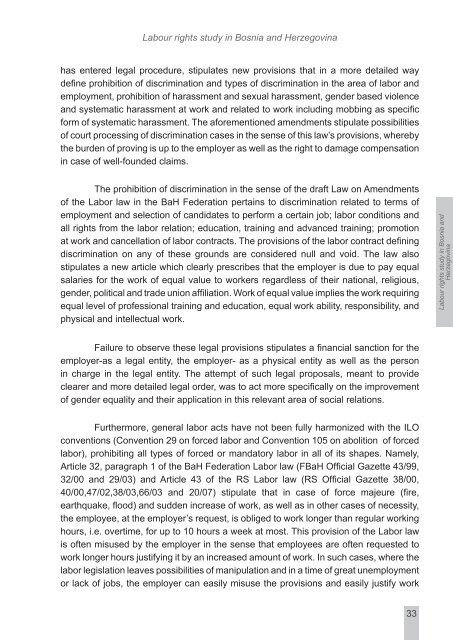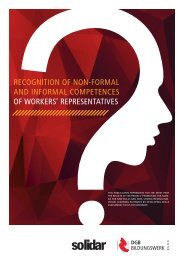ZAÅ TITA PRAVA U BOSNI I HERCEGOVINI - Solidar
ZAÅ TITA PRAVA U BOSNI I HERCEGOVINI - Solidar
ZAÅ TITA PRAVA U BOSNI I HERCEGOVINI - Solidar
Create successful ePaper yourself
Turn your PDF publications into a flip-book with our unique Google optimized e-Paper software.
Labour rights study in Bosnia and Herzegovina<br />
has entered legal procedure, stipulates new provisions that in a more detailed way<br />
defi ne prohibition of discrimination and types of discrimination in the area of labor and<br />
employment, prohibition of harassment and sexual harassment, gender based violence<br />
and systematic harassment at work and related to work including mobbing as specifi c<br />
form of systematic harassment. The aforementioned amendments stipulate possibilities<br />
of court processing of discrimination cases in the sense of this law’s provisions, whereby<br />
the burden of proving is up to the employer as well as the right to damage compensation<br />
in case of well-founded claims.<br />
The prohibition of discrimination in the sense of the draft Law on Amendments<br />
of the Labor law in the BaH Federation pertains to discrimination related to terms of<br />
employment and selection of candidates to perform a certain job; labor conditions and<br />
all rights from the labor relation; education, training and advanced training; promotion<br />
at work and cancellation of labor contracts. The provisions of the labor contract defi ning<br />
discrimination on any of these grounds are considered null and void. The law also<br />
stipulates a new article which clearly prescribes that the employer is due to pay equal<br />
salaries for the work of equal value to workers regardless of their national, religious,<br />
gender, political and trade union affi liation. Work of equal value implies the work requiring<br />
equal level of professional training and education, equal work ability, responsibility, and<br />
physical and intellectual work.<br />
Labour rights study in Bosnia and<br />
Herzegovina<br />
Failure to observe these legal provisions stipulates a fi nancial sanction for the<br />
employer-as a legal entity, the employer- as a physical entity as well as the person<br />
in charge in the legal entity. The attempt of such legal proposals, meant to provide<br />
clearer and more detailed legal order, was to act more specifi cally on the improvement<br />
of gender equality and their application in this relevant area of social relations.<br />
Furthermore, general labor acts have not been fully harmonized with the ILO<br />
conventions (Convention 29 on forced labor and Convention 105 on abolition of forced<br />
labor), prohibiting all types of forced or mandatory labor in all of its shapes. Namely,<br />
Article 32, paragraph 1 of the BaH Federation Labor law (FBaH Offi cial Gazette 43/99,<br />
32/00 and 29/03) and Article 43 of the RS Labor law (RS Offi cial Gazette 38/00,<br />
40/00,47/02,38/03,66/03 and 20/07) stipulate that in case of force majeure (fi re,<br />
earthquake, fl ood) and sudden increase of work, as well as in other cases of necessity,<br />
the employee, at the employer’s request, is obliged to work longer than regular working<br />
hours, i.e. overtime, for up to 10 hours a week at most. This provision of the Labor law<br />
is often misused by the employer in the sense that employees are often requested to<br />
work longer hours justifying it by an increased amount of work. In such cases, where the<br />
labor legislation leaves possibilities of manipulation and in a time of great unemployment<br />
or lack of jobs, the employer can easily misuse the provisions and easily justify work<br />
33
















